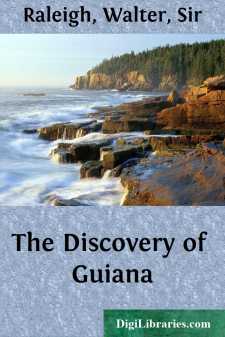Categories
- Antiques & Collectibles 13
- Architecture 36
- Art 48
- Bibles 22
- Biography & Autobiography 813
- Body, Mind & Spirit 142
- Business & Economics 28
- Children's Books 17
- Children's Fiction 14
- Computers 4
- Cooking 94
- Crafts & Hobbies 4
- Drama 346
- Education 46
- Family & Relationships 57
- Fiction 11829
- Games 19
- Gardening 17
- Health & Fitness 34
- History 1377
- House & Home 1
- Humor 147
- Juvenile Fiction 1873
- Juvenile Nonfiction 202
- Language Arts & Disciplines 88
- Law 16
- Literary Collections 686
- Literary Criticism 179
- Mathematics 13
- Medical 41
- Music 40
- Nature 179
- Non-Classifiable 1768
- Performing Arts 7
- Periodicals 1453
- Philosophy 64
- Photography 2
- Poetry 896
- Political Science 203
- Psychology 42
- Reference 154
- Religion 513
- Science 126
- Self-Help 84
- Social Science 81
- Sports & Recreation 34
- Study Aids 3
- Technology & Engineering 59
- Transportation 23
- Travel 463
- True Crime 29
The Discovery of Guiana
by: Walter Raleigh
Categories:
Description:
Excerpt
INTRODUCTORY NOTE
Sir Walter Raleigh may be taken as the great typical figure of the age of Elizabeth. Courtier and statesman, soldier and sailor, scientist and man of letters, he engaged in almost all the main lines of public activity in his time, and was distinguished in them all.
His father was a Devonshire gentleman of property, connected with many of the distinguished families of the south of England. Walter was born about 1552 and was educated at Oxford. He first saw military service in the Huguenot army in France in 1569, and in 1578 engaged, with his half-brother, Sir Humphrey Gilbert, in the first of his expeditions against the Spaniards. After some service in Ireland, he attracted the attention of the Queen, and rapidly rose to the perilous position of her chief favorite. With her approval, he fitted out two expeditions for the colonization of Virginia, neither of which did his royal mistress permit him to lead in person, and neither of which succeeded in establishing a permanent settlement.
After about six years of high favor, Raleigh found his position at court endangered by the rivalry of Essex, and in 1592, on returning from convoying a squadron he had fitted out against the Spanish, he was thrown into the Tower by the orders of the Queen, who had discovered an intrigue between him and one of her ladies whom he subsequently married. He was ultimately released, engaged in various naval exploits, and in 1594 sailed for South America on the voyage described in the following narrative.
On the death of Elizabeth, Raleigh's misfortunes increased. He was accused of treason against James I, condemned, reprieved, and imprisoned for twelve years, during which he wrote his "History of the World," and engaged in scientific researches. In 1616 he was liberated, to make another attempt to find the gold mine in Venezuela; but the expedition was disastrous, and, on his return, Raleigh was executed on the old charge in 1618. In his vices as in his virtues, Raleigh is a thorough representative of the great adventurers who laid the foundations of the British Empire.
The Discovery of the large, rich, and beautiful EMPIRE Of GUIANA; with a Relation of the great and golden CITY of MANOA, which the Spaniards call EL DORADO, and the PROVINCES of EMERIA, AROMAIA, AMAPAIA, and other Countries, with their rivers, adjoining. Performed in the year 1595 by Sir WALTER RALEIGH, KNIGHT, CAPTAIN of her Majesty's GUARD, Lord Warden of the STANNARIES, and her Highness' LIEUTENANT-GENERAL of the COUNTY of CORNWALL.
To the Right Honourable my singular good Lord and kinsman CHARLES HOWARD, Knight of the Garter, Baron, and Councillor, and of the Admirals of England the most renowned; and to the Right Honourable SIR ROBERT CECIL, KNIGHT, Councillor in her Highness' Privy Councils.
For your Honours' many honourable and friendly parts, I have hitherto only returned promises; and now, for answer of both your adventures, I have sent you a bundle of papers, which I have divided between your Lordship and Sir Robert Cecil, in these two respects chiefly; first, for that it is reason that wasteful factors, when they have consumed such stocks as they had in trust, do yield some colour for the same in their account; secondly, for that I am assured that whatsoever shall be done, or written, by me, shall need a double protection and defence....


